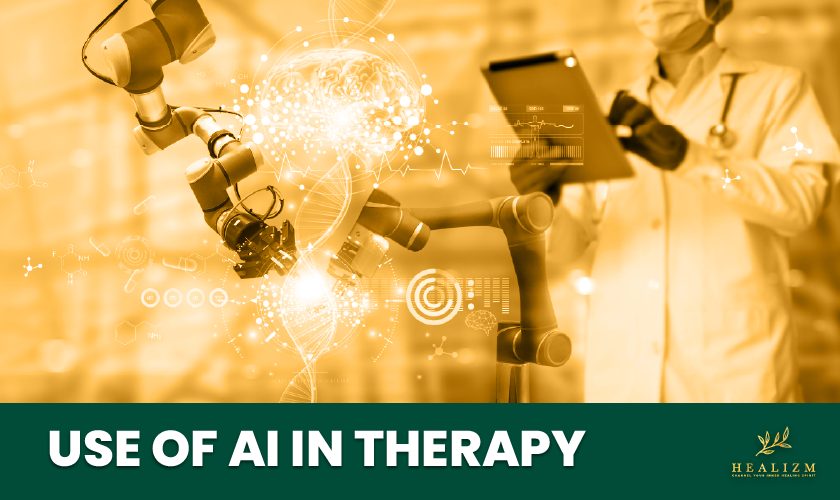AI Therapy And The Surveillance State: A Critical Analysis

Table of Contents
Data Privacy Concerns in AI Therapy
AI therapy platforms, while offering convenient access to mental health support, collect vast amounts of personal data, raising significant privacy concerns. This data, often highly sensitive, needs robust protection against breaches and misuse.
Data Collection and Storage
AI therapy apps and platforms collect a wide range of personal data, including:
- Location data: Tracking user location during therapy sessions.
- Communication patterns: Analysis of language, tone, and frequency of communication.
- Emotional responses: Monitoring emotional states through voice analysis or text sentiment.
- Personal details: Demographic information, medical history, and personal experiences.
This data is vulnerable to breaches and misuse. Current data protection regulations often lack the specificity needed to address the unique challenges posed by AI therapy. We've seen examples in other healthcare sectors – from hospital systems to insurance providers – where data breaches have resulted in significant harm to patients. The lack of robust, AI-specific regulations in this field leaves users vulnerable.
Data Security and Encryption
AI therapy providers implement various security measures, including encryption protocols, data anonymization techniques, and access control measures. However, the effectiveness of these measures is debatable. The sophisticated nature of cyberattacks constantly challenges existing security technologies.
- Encryption protocols: While encryption protects data in transit and at rest, vulnerabilities can still exist.
- Data anonymization techniques: These techniques can be circumvented, especially with advanced data analysis methods.
- Access control measures: Even with strong access controls, insider threats or successful hacking attempts can compromise data security.
The potential for data to be used for purposes beyond therapeutic intervention – for example, by insurance companies or employers – presents a significant ethical dilemma.
Informed Consent and Transparency
Informed consent is crucial in AI therapy. Users must understand how their data will be used, stored, and protected. However, the complexity of AI algorithms and data processing makes achieving truly informed consent challenging.
- Clarity of privacy policies: Many privacy policies are lengthy, complex, and difficult for the average user to understand.
- User control over data sharing: Users often lack sufficient control over how their data is shared and with whom.
- Transparency regarding algorithms and decision-making processes: The lack of transparency in how algorithms interpret user data raises concerns about bias and fairness.
The inherent power imbalance between users and AI therapy providers further complicates the issue of informed consent. Users might feel pressured to accept data collection practices they don't fully understand.
Algorithmic Bias and Discrimination in AI Therapy
AI algorithms are trained on data sets, and biases present in these data sets can lead to discriminatory outcomes in AI therapy. This is a critical concern that needs careful consideration.
Bias in Data Sets
The data used to train AI therapy algorithms often reflects existing societal biases. This can lead to:
- Overrepresentation of certain demographics: Algorithms may perform better for certain demographic groups due to an overabundance of data for those groups in the training set.
- Underrepresentation of marginalized groups: Lack of data from marginalized groups can lead to algorithms that fail to meet the needs of these populations effectively and fairly.
- Biased interpretations of language and emotional cues: Algorithms may misinterpret the emotional expressions or language used by individuals from different cultural backgrounds.
Algorithmic Fairness and Accountability
Ensuring algorithmic fairness and accountability in AI therapy is extremely challenging.
- Lack of transparency in algorithm design: The "black box" nature of many algorithms makes it difficult to identify and correct biases.
- Difficulty in auditing algorithms for bias: Existing methods for auditing algorithms for bias are often insufficient.
- Need for human oversight: Human oversight is crucial to ensure that AI therapy aligns with ethical principles and does not perpetuate harm.
Impact on Vulnerable Populations
AI therapy has the potential to exacerbate existing inequalities. Vulnerable populations, such as those with limited digital literacy, members of marginalized communities, and individuals with severe mental health conditions, are particularly at risk.
The Surveillance State and AI Therapy
The convergence of AI therapy and the surveillance state poses significant risks to privacy and autonomy.
Government Access to Data
Government agencies might seek access to data collected by AI therapy platforms for various reasons, including:
- National security concerns: Data could be used in investigations related to terrorism or other threats.
- Law enforcement investigations: Data might be used as evidence in criminal investigations.
- Public health monitoring: Data could be used to track the spread of infectious diseases or mental health crises.
Erosion of Privacy and Autonomy
The integration of AI therapy with other surveillance technologies can further erode user privacy and autonomy.
- Facial recognition: AI therapy apps could integrate facial recognition technology to monitor user emotional states.
- Location tracking: Location data collected during therapy sessions could be used to track user movements.
- Social media data integration: AI therapy platforms could integrate social media data to gain a more comprehensive understanding of user behavior.
Potential for Misuse and Manipulation
AI therapy platforms are susceptible to misuse for surveillance, manipulation, and control. This is a significant ethical concern that requires attention.
Conclusion
AI therapy holds immense potential for improving access to mental healthcare. However, its development and implementation must prioritize ethical considerations and user privacy. The convergence of AI therapy and the surveillance state presents significant challenges regarding data privacy, algorithmic bias, and the erosion of autonomy. Addressing these concerns requires robust regulations, transparency in algorithm design, and a focus on user control over personal data. We must engage in a critical dialogue about the future of AI therapy, ensuring its development aligns with ethical principles and safeguards individual rights. Only through careful consideration and proactive measures can we harness the benefits of AI therapy while mitigating the risks associated with AI Therapy Surveillance State. Let's work together to ensure responsible innovation in this crucial field.

Featured Posts
-
 The Story Behind Tom Cruises Post Suri Birth Actions
May 16, 2025
The Story Behind Tom Cruises Post Suri Birth Actions
May 16, 2025 -
 Shooting At Ohio City Apartment Police Seek Witnesses
May 16, 2025
Shooting At Ohio City Apartment Police Seek Witnesses
May 16, 2025 -
 Microsofts Restructuring 6 000 Job Cuts Announced
May 16, 2025
Microsofts Restructuring 6 000 Job Cuts Announced
May 16, 2025 -
 Exploring Jeremy Arndts Contributions To Bvg Negotiations
May 16, 2025
Exploring Jeremy Arndts Contributions To Bvg Negotiations
May 16, 2025 -
 Steam Sales 2025 Complete Guide To Dates And Times
May 16, 2025
Steam Sales 2025 Complete Guide To Dates And Times
May 16, 2025
Latest Posts
-
 La Ligas Ai Revolution Global Impact And Leadership
May 16, 2025
La Ligas Ai Revolution Global Impact And Leadership
May 16, 2025 -
 The Block Mirror Dystopian Site Innovative Solutions For Trigger Blocking And Circumvention
May 16, 2025
The Block Mirror Dystopian Site Innovative Solutions For Trigger Blocking And Circumvention
May 16, 2025 -
 La Ligas Illegal Blocking Cloudflare Takes Legal Action To Protect User Privacy
May 16, 2025
La Ligas Illegal Blocking Cloudflare Takes Legal Action To Protect User Privacy
May 16, 2025 -
 Analyzing Block Mirror A Dystopian Sites Approach To Trigger Blocking And Circumvention
May 16, 2025
Analyzing Block Mirror A Dystopian Sites Approach To Trigger Blocking And Circumvention
May 16, 2025 -
 Dystopian Site Innovations How Block Mirror Bypasses Censorship And Triggers
May 16, 2025
Dystopian Site Innovations How Block Mirror Bypasses Censorship And Triggers
May 16, 2025
